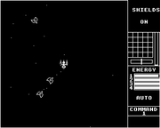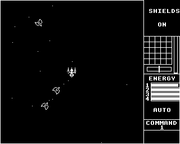
Starship Command
Encyclopedia
Acornsoft
's Starship Command is a computer game released in 1983 for the BBC Micro
and Acorn Electron
. It was available on cassette as well as 5.25" disc for the BBC and ROM cartridge for the Acorn Electron Plus 1 expansion module.
 The player assumes the role of captain of a battle starship, charged with defending the frontiers of space from hostile alien ships, which come in two sizes — large and small. In later commands, the larger ships have cloaking devices which make them invisible. Damage is inflicted on ships when they are shot or rammed by other ships.
The player assumes the role of captain of a battle starship, charged with defending the frontiers of space from hostile alien ships, which come in two sizes — large and small. In later commands, the larger ships have cloaking devices which make them invisible. Damage is inflicted on ships when they are shot or rammed by other ships.
Uniquely for the time, the player vessel remains locked in the centre of the screen and the world rotates and moves around it. Player shots also have limited range and are subject the to same rotation as everything else, which means the player needs to predict where shots will need to go in order to hit the enemies. The ship has both long range scanners and shields but may only use one at a time. By default the game will automatically switch between them based on the proximity of enemy vessels but the player can optionally take full control.
Unusually, the player is never expected to return their ship from the frontiers. Each individual voyage is a separate command, and lasts either until the player's vessel is destroyed or until they use an escape capsule. If the escape capsule is successfully launched, which means firing it so that it doesn't collide with any enemy ships, and the player is judged by Star-Fleet to have killed enough enemies during his command then he is given a new commission and a new and visually different ship. 8 points are scored for a small ship and 12 for a large ship. Starfleet opinion of your performance ranges from them being "furious" to "delighted". The number of points required to reach the next levels is not fixed. Sometimes a score of 60 will suffice and sometimes a score of 80 will not be enough to guarantee automatic promotion to the next level, assuming the escape capsule was jettisoned safely. Strangely more points were awarded when an escape capsule collided with and destroyed an enemy ship as opposed to being shot or colliding with the starship.
Later commands take place in faster environments and with greater numbers of enemy. There are 8 different starship designs, which repeat after level 8.
, concluded that "The game seems to have everything. The graphics are superb, the instructions thorough and, once you get used to the way your ship stays still while the aliens move, the whole thing is enthralling". The BBC version was reviewed in Computer and Video Games
and received a score of 90%.
Acornsoft
Acornsoft was the software arm of Acorn Computers Ltd, and a major publisher of software for the BBC Micro and Acorn Electron. As well as games, they also produced a large number of educational titles, extra computer languages and business and utility packages - these included ROM-based word...
's Starship Command is a computer game released in 1983 for the BBC Micro
BBC Micro
The BBC Microcomputer System, or BBC Micro, was a series of microcomputers and associated peripherals designed and built by Acorn Computers for the BBC Computer Literacy Project, operated by the British Broadcasting Corporation...
and Acorn Electron
Acorn Electron
The Acorn Electron is a budget version of the BBC Micro educational/home computer made by Acorn Computers Ltd. It has 32 kilobytes of RAM, and its ROM includes BBC BASIC along with its operating system....
. It was available on cassette as well as 5.25" disc for the BBC and ROM cartridge for the Acorn Electron Plus 1 expansion module.
Gameplay

Uniquely for the time, the player vessel remains locked in the centre of the screen and the world rotates and moves around it. Player shots also have limited range and are subject the to same rotation as everything else, which means the player needs to predict where shots will need to go in order to hit the enemies. The ship has both long range scanners and shields but may only use one at a time. By default the game will automatically switch between them based on the proximity of enemy vessels but the player can optionally take full control.
Unusually, the player is never expected to return their ship from the frontiers. Each individual voyage is a separate command, and lasts either until the player's vessel is destroyed or until they use an escape capsule. If the escape capsule is successfully launched, which means firing it so that it doesn't collide with any enemy ships, and the player is judged by Star-Fleet to have killed enough enemies during his command then he is given a new commission and a new and visually different ship. 8 points are scored for a small ship and 12 for a large ship. Starfleet opinion of your performance ranges from them being "furious" to "delighted". The number of points required to reach the next levels is not fixed. Sometimes a score of 60 will suffice and sometimes a score of 80 will not be enough to guarantee automatic promotion to the next level, assuming the escape capsule was jettisoned safely. Strangely more points were awarded when an escape capsule collided with and destroyed an enemy ship as opposed to being shot or colliding with the starship.
Later commands take place in faster environments and with greater numbers of enemy. There are 8 different starship designs, which repeat after level 8.
Critical reception
Although none of the Acorn magazines were in the habit of giving review scores at the time, the game received generally very favourable reviews. Peter Gray, writing in the October 1983 edition of Electron UserElectron User
Electron User was a magazine targeted at owners of the Acorn Electron microcomputer. It was published by Database Publications of Stockport, starting in October 1983 and ending after 82 issues in July 1990....
, concluded that "The game seems to have everything. The graphics are superb, the instructions thorough and, once you get used to the way your ship stays still while the aliens move, the whole thing is enthralling". The BBC version was reviewed in Computer and Video Games
Computer and video games
A video game is an electronic game that involves human interaction with a user interface to generate visual feedback on a video device. The word video in video game traditionally referred to a raster display device, but following popularization of the term "video game", it now implies any type of...
and received a score of 90%.

